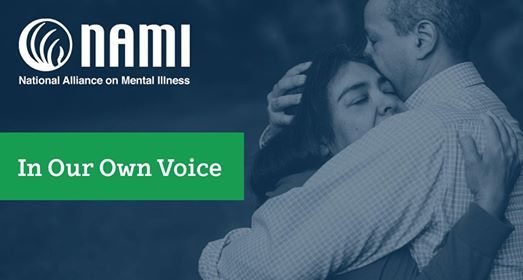NAMI In Our Own Voice
MODALITY: presentation

Get Started in planning your school's first presentation by visiting NAMI.

Summary
NAMI Ending the Silence is an engaging presentation that helps audience members learn about the warning signs of mental health conditions and what steps to take if you or a loved one are showing symptoms of a mental health condition.
Implementation
Program Material Cost
Free
Modality
Classroom Presentation
Setting
Classrooms, health classes, school-wide assemblies, teacher professional development days, in-person or online
Grade Level(s)
Middle
High
Rubric and Standards
Mental Health Literacy Components
Decreasing stigma
Understanding how to foster and maintain positive mental health
Understanding how to seek help effectively
Understanding mental health disorders and their treatments
High School Learning Standards
Advocate for reducing stigma associated with emotional and mental and behavioral health
Compare & contrast emotional, mental-behavioral illness, mental well-being and concurrent disorders
Describe how self-harm or suicide impacts other people
Describe laws related to minors accessing mental health care
Explain how to help someone who is thinking about attempting suicide
Identify school and community resources that can help a person with emotional, mental and behavioral health concerns
Evidence
Publication Types
1 Peer-Reviewed Publication
Study Types
Randomized Control Trial
Study Samples
156 Female US students (13-17 yrs old)
Major Findings
No immediate outcomes were found for students who participated in the In Our Own Voice intervention. However, at 4 and 8 weeks post intervention, adjusting for baseline scores of mental health literacy, level-of-contact, socioeconomic level, age, race, and grade, adolescents in the intervention group scored significantly higher on mental health literacy.
Published Studies
Published
Study Type
Sample
Findings
Adjusting for baseline scores of mental health literacy, level-of-contact, socioeconomic level, age, race, and grade, adolescents in the intervention group did not score significantly different than those in the control group in mental health literacy immediately after the intervention (95% CI = −.76–2.68, p=.27). However, when controlling for the same covariates at 4 and 8 weeks post intervention, adolescents in the intervention group did score significantly higher on mental health literacy (95% CI=.71–3.53, p=.03). Additionally, there were no significant differences between groups for mental illness stigma at any time point.
